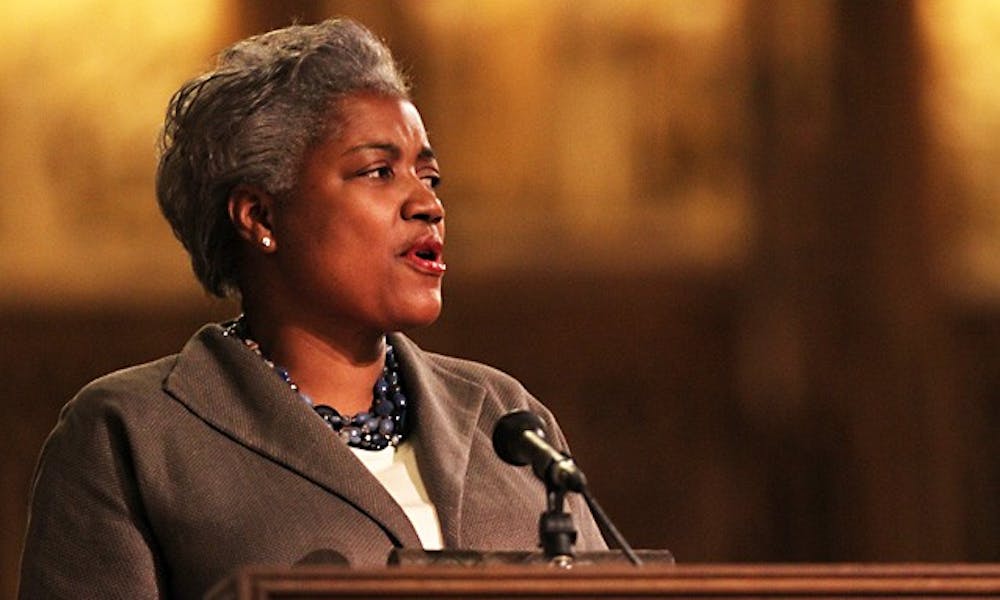The vice chair of voter registration of the Democratic National Committee insists that Dr. Martin Luther King Jr.’s work is far from finished.
Donna Brazile, who managed Al Gore’s 2000 presidential campaign and is a regular political commentator for CNN, spoke in the Duke Chapel Sunday at a service honoring King’s legacy. She recounted her personal experience as a political strategist and urged students to continue to honor King’s memory.
“Dr. King put us on the path to where we are today, and that is to give every American citizen—every eligible citizen—the power to change their own lives and transform their community,” Brazile said. “He knew instinctively, as a man of God would know, that his own life was yet to be fulfilled only if he believed that he could make this, the United States of America, a more perfect union.”
Brazile detailed her experience working on the campaign to make King’s birthday a national holiday. The holiday was proposed in the House of Representatives, and was signed into law by President Ronald Reagan in 1983. It was observed for the first time in 1986. Brazile noted that she was responsible for mobilizing youth to sign a petition to create the holiday.
Brazile maintained that King’s work was unfinished, citing high poverty and unemployment rates, and called upon people to help end it.
Brazile added that state laws that required voters to present a government-issued form of identification placed unfair burdens on certain groups, like blacks, the elderly and lower-income citizens.
“To me, the right to vote is the most important of all of our rights. It is, what many have said, the lifeblood of our democracy,” she noted. “I’m now on my own campaign to ensure that the right to vote is not taken away from ordinary people ever again.”
The North Carolina General Assembly passed a voter ID law in June, but it was vetoed by Gov. Bev Perdue. Other states, including South Carolina, have faced challenges from the Justice Department over the constitutionality of such laws.
“Under the guise of fighting a non-existent enemy, scores and scores and scores of people are going to lose their right to vote,” Brazile said. “We should demand the ballot because an election where 21 million eligible citizens cannot vote is an election that undermines democracy.”
Floyd Wilks Jr., a sophomore and member of Duke’s Alpha Phi Alpha fraternity, said that he did not believe that voter ID laws were written to deny groups the right to vote.
Brazile said she would refrain from political discussion, given that her speech was held in Duke Chapel. She did, however, indirectly reference the North Carolina Same-Sex Marriage Amendment, a proposed amendment that defines marriage as between one man and one woman.
“Let us leave here determined to work for civil and human rights,” Brazile said. “Let us leave here determined to defeat any amendment put on the ballot, even in North Carolina, that will divide us and distract us. Let us not legislate hate into law. Even if it’s popular, don’t buy it.”
Brazile reaffirmed the importance of King’s ideals and urged students to act to continue his cause.
“I cannot help but feel that this is the perfect season to have an extended observance of Dr. King’s ideals,” she said. “We cannot be inspired by his dream without taking action to make it a reality.”
Wilks said he believes King was responsible for providing blacks with the rights they now enjoy.
“I just think he’s very important for society,” Wilks said. “Without him, many of the rights that we as African-Americans have wouldn’t be possible.”
President Richard Brodhead, who spoke before Brazile, recounted Duke’s own history of segregation. He said that the University will soon be celebrating 50 years of admitting black students.
Brodhead argued, however, that segregation was not successful. He noted that one of the main architects of Duke’s campus, Julian Abele, was black.
Nana Asante, president of Duke’s Black Student Alliance, also spoke at the event, called upon students to act to honor Dr. King’s legacy.
“We cannot—the students, the community, the institution, most importantly—act through indifference, and we definitely cannot honor through passivity,” Asante said.
Get The Chronicle straight to your inbox
Signup for our weekly newsletter. Cancel at any time.

